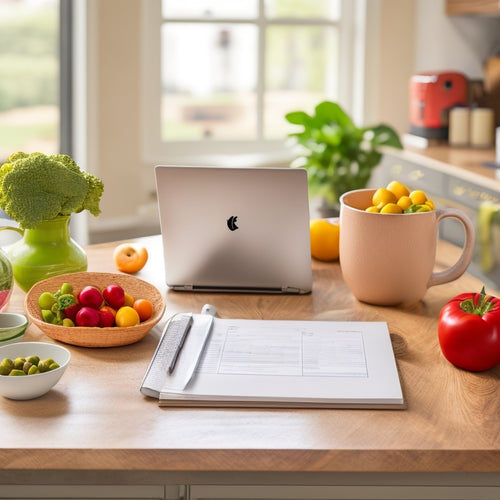
Unlocking the Secrets: Commercial Kitchen Construction Costs
Share
You're likely looking at a commercial kitchen construction project with a total cost that falls between $15,000 and over $100,000, depending on the scope of your build-out. The cost breaks down into equipment, design, and construction expenses, with location significantly impacting the total cost. A rough estimate is around $250 per square foot. To make informed decisions, it's crucial to understand the cost breakdown and location impact. With a solid grasp of these factors, you'll be well-equipped to navigate the complexities of commercial kitchen construction and make smart financial decisions that set your business up for long-term success.
Key Takeaways
• Commercial kitchen construction costs range from $15,000 to over $100,000, depending on equipment, design, and construction expenses.
• Location significantly impacts costs, with major cities having higher construction costs, averaging around $250 per square foot.
• Breaking down costs into equipment, design, and construction expenses helps entrepreneurs make informed decisions and allocate funds effectively.
• Prioritizing equipment efficiency, regulatory compliance, and workflow optimization is crucial for a well-designed kitchen that enhances productivity and dining experience.
• Developing a detailed budgeting strategy and identifying areas for cost savings helps ensure a financially sustainable commercial kitchen operation.
Understanding Commercial Kitchen Costs
When planning to build a commercial kitchen, one of the most critical factors to take into account is the cost, which can range from $15,000 to over $100,000, depending on the size, menu, and location of your kitchen.
You'll want to break down the cost into manageable components, including equipment, design, and construction expenses. The location of your kitchen plays a significant role in the overall cost, with major cities typically having higher construction costs.
A rough estimate for building a commercial kitchen is around $250 per square foot. Understanding the cost breakdown and location impact will help you make informed decisions and stay within your budget.
Design and Build Considerations
As you commence designing and constructing your commercial kitchen, you'll need to weigh several important factors that can greatly impact your overall cost and workflow. One vital consideration is equipment efficiency, ensuring that your layout optimizes productivity and minimizes energy consumption.
You must also prioritize compliance with regulations and safety standards, such as proper ventilation, fire suppression systems, and easy-to-clean surfaces. A well-designed kitchen will improve staff productivity, reduce waste, and enhance the overall dining experience.
Equipment Choices and Procurement
Choosing the right equipment for your commercial kitchen is vital, as it directly impacts your menu's feasibility, labor costs, and overall profitability. You'll need to balance functionality, quality, and cost to guarantee a smooth operation.
Reflect on equipment selection and financing options to stay within budget.
Develop a procurement process with realistic timelines to avoid delays.
Research manufacturers and suppliers to find the best deals on high-quality equipment.
When it comes to procurement, having a clear plan and timeline is essential. You'll need to research and compare prices, consider lead times, and plan for potential supply chain disruptions.
Planning and Budgeting Strategies
You'll need to develop a detailed budgeting strategy that accounts for every aspect of your commercial kitchen construction, from equipment and design to labor and contingency costs, to guarantee a successful and financially sustainable operation. Effective budgeting tips include identifying areas for cost savings, prioritizing essential expenses, and allocating funds for unexpected expenses.
To optimize financial planning, consider expense management strategies such as tracking vendor prices, negotiating contracts, and exploring energy-efficient solutions. By implementing these cost-saving measures, you'll be able to manage your expenses efficiently and secure a profitable business.
Navigating Construction and Logistics
With a solid budget in place, you can now focus on managing the complex process of commercial kitchen construction and logistics, where careful planning and execution are crucial to staying on schedule and within budget.
To navigate this process successfully, consider the following key factors:
-
Construction challenges: Identify potential roadblocks that could impact your timeline, such as permit delays or material shortages, and develop contingency plans to mitigate their effects.
-
Logistics management: Coordinate with suppliers and contractors to guarantee timely delivery of materials and equipment, and schedule installations to minimize downtime.
-
Timeline coordination: Create a master schedule that integrates construction milestones, equipment delivery, and staff training to guarantee a smooth shift to operational readiness.
Frequently Asked Questions
What Are the Benefits of Hiring a Project Manager for Kitchen Construction?
When you hire a project manager for kitchen construction, you'll enjoy cost efficiency through budget tracking and timeline management, ensuring your project stays on schedule and within budget, giving you control over the process.
Can I Reuse Existing Kitchen Equipment in a New Commercial Kitchen?
You can reuse existing kitchen equipment in a new commercial kitchen, but verify equipment compatibility and consider refurbishing or upgrading to guarantee efficiency and cost savings.
How Do I Ensure My Kitchen Design Meets Local Building Codes?
You guarantee your kitchen design meets local building codes by obtaining necessary building permits, undergoing regular inspections, and complying with strict regulations and standards, ensuring a safe and legally sound commercial kitchen operation.
What Is the Average ROI for a Commercial Kitchen Renovation?
You'll want to contemplate a renovation timeline and budget factors to maximize your ROI. Implement cost-saving strategies, explore financing options, and prioritize high-impact changes to achieve an average ROI of 10-15% for your commercial kitchen renovation.
Are There Any Government Incentives for Sustainable Kitchen Design?
You'll find government incentives for sustainable kitchen design, such as the Energy Policy Act, which offers tax deductions for energy-efficient equipment, and the Environmental Protection Agency's WaterSense program, providing rebates for water-conserving appliances.
Related Posts
-
Versatile Stainless Steel Carving Fork: Serve And Carve Meat Safely
In the world of culinary arts, precision and safety are paramount. Imagine a versatile stainless steel carving fork t...
-

Free Low-Carb Meal Planning Templates for Easy Success
You're about to discover the secret to effortless low-carb meal planning: leveraging free, customizable templates tha...
